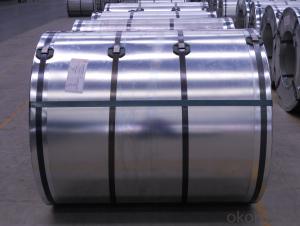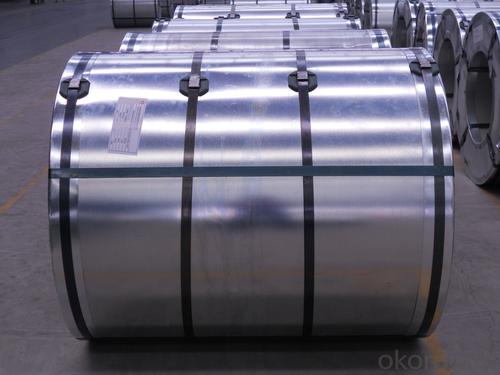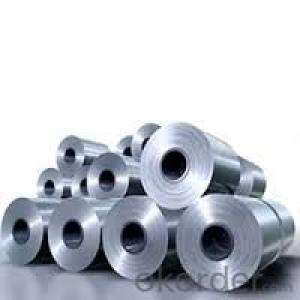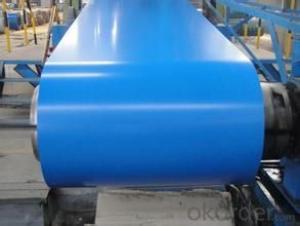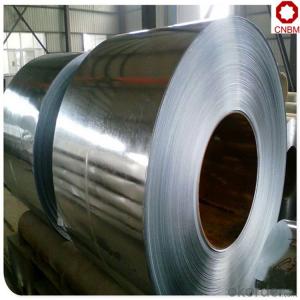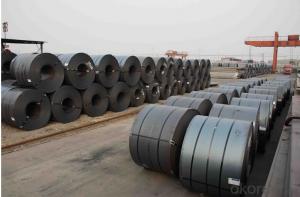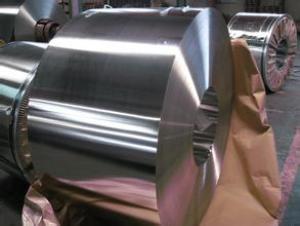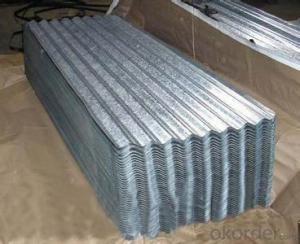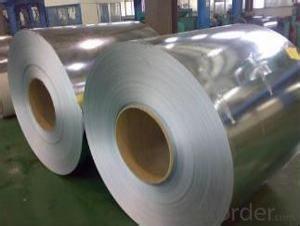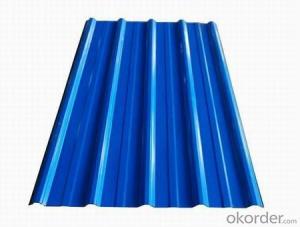Hot Dipped Galvanized Steel Coil/Sheet-0.3mm*1250mm*C
- Loading Port:
- Tianjin
- Payment Terms:
- TT OR LC
- Min Order Qty:
- -
- Supply Capability:
- 15000 m.t./month
OKorder Service Pledge
OKorder Financial Service
You Might Also Like
Galvanized steel sheet /coil :
Galvanized steel coils are widely used in the construction industry, as raw material for the production of corrugated panels, fencing products, drywall panel profiles, ventilation systems etc. Recommended for both outside and inside usage, galvanized steel has a high resistance to corrosion in different environments, due to a protective layer of zinc of 100 – 180 grams per square metre.
SPECIFICATIONS:
1. Zinc coating :60-220g/m2( as required)
2. Thickness:0.13-3.0mm
3. Width:600-1250mm(900mm,1215mm,1250mm,1000mm the most common)
4. Coil id:508mm
5. Coil weight: 3-5MT(as required)
6. Surface:regular/mini/zero spangle, chromated, skin pass, dry etc.
7. Application: With excellent cold bending molded manufacturablity, good decoration effect, strong anti-corrosion ability, galvanized steel coils and sheets are also pollution-free and easily recycled.
- Q: How are steel coils used in the production of kitchen appliances?
- Steel coils are used in the production of kitchen appliances as they are shaped, cut, and formed into various components such as bodies, doors, panels, and frames. These coils provide the necessary strength, durability, and stability required for the construction of kitchen appliances, ensuring the longevity and reliability of the finished products.
- Q: How are steel coils processed and shaped for specific applications?
- Steel coils are processed and shaped for specific applications through a series of manufacturing processes. These processes typically include cleaning, pickling, cold rolling, annealing, and slitting. Cleaning removes any surface impurities, pickling removes scale and oxides, cold rolling reduces the thickness and enhances the strength, annealing improves ductility and reduces hardness, and finally, slitting cuts the coils into desired widths. These steps ensure that steel coils are transformed into the appropriate shape and size required for specific applications, such as in construction, automotive, or manufacturing industries.
- Q: Is steel cut really better? The nutritional profiles are nealy identical. Which one has the best flavor??Thanks!
- The biggest difference, is steel cut oats tend to be a European way, and Rolled oats are more North American, Irish and Scottish Oats tend to be steel cut, take longer to cook as the germ and whole grain is almost shredded, where with rolled oats it is process to were only a portion of the bran remains, that is why you can by Oat Bran in North America. We have instant, quick and large flake from Quaker, all cook in a matter of between 2-10 minutes, steel cut can take up to 25-30 minutes and do better in a double boiler, my mother tells a story were her grandmother would prepare it at night and let it sit on the back of the wood stove all night for breakfast the next day.
- Q: I bought a Remington 870 super mag last fall and wanted to to switch to non-tox steel loads. The gun came with a modified rem choke. I know that not all chokes are qualified to handle steel. It doesn't say anywhere on the choke no steel I was just wondering if anyone out there knew for sure that those chokes that the guns come with won't get damaged be steel.
- No problem. With steel shot you would use one choke size LARGER. If you want a full choke type pattern ( 70 % in a 30 inch circle at 30 yards ) you use a modified choke. if you want a modified pattern use the improved cylinder. Don't use the full or extra full. This is because when using lead shot it deforms, and fits through the choke, steel shot does not deform, it remains rigid. The first indication of a problem will be a slight bulge in the barrel right behind the choke. Check that once in a while, if you ever have that problem, it is not drastic if caught early. Today's modern shotguns all have been set up for steel shot. The old ones such as Belgium Brownings, are a no go. Funny thing, when we first began importing steel shot, I asked a Browning Tech guy if he thought I could fire steel out of my Belgium Browning. He said not a good idea, however, if you have the Citori or other Japanese made Brownings, no problem. Hummm, my expensive Brownings, no, but Japanese made OK, this is because the Japanese steel was higher quality. Geeeze. I was shocked.
- Q: How are steel coils processed for further use?
- Steel coils are processed for further use through a series of steps including uncoiling, leveling, cutting, and shaping. The coils are first uncoiled to separate them into individual sheets. Then, the sheets undergo leveling to remove any imperfections and ensure a flat surface. After that, the sheets are cut into desired lengths or shapes using precision cutting tools. Finally, the cut sheets are shaped according to the specific requirements of their intended application, such as bending, rolling, or stamping.
- Q: How do steel coils contribute to the automotive aftermarket?
- Steel coils contribute to the automotive aftermarket by serving as a crucial raw material for manufacturing various components used in vehicles. These coils are responsible for providing strength, durability, and structural integrity to parts like body panels, chassis components, suspension systems, and exhaust systems. Additionally, steel coils are also used in the production of aftermarket accessories such as bumpers, grilles, and custom body kits. Their availability and versatility make steel coils an essential resource for the automotive industry, enabling the production of high-quality aftermarket products that enhance the performance and aesthetics of vehicles.
- Q: Monopolistic competition means all of their products are identical like things in supermarket like milk. There are no high barriers to entry. Oil and steel are all same in all industries.
- While oil and steel may seem to be all the same, they are really not. There are many different grades of crude oil and many different types of steel.
- Q: Can steel coils be coated with thermally insulating materials?
- Yes, steel coils can be coated with thermally insulating materials.
- Q: if someone wanted to melt cast steel or iron into small-relatively simple shapes such as rod-tapered rod-or etc... how would you go about melting the steel/iron what would the mold need to be made of?
- Steel is melted in a cupola furnace. you don`t cast rods you cast a large ingot and then while its red hot and still soft it is rolled in between gradually reducing shaped rollers so it gets stretched out and the structure of the metal makes it less likely to snap.
- Q: How are steel coils used in the manufacturing of construction bulldozers?
- Steel coils are used in the manufacturing of construction bulldozers as they provide the necessary strength and durability required for the heavy-duty components of the machine. These coils are typically shaped and welded to form the structural frame, blades, and bucket of the bulldozer, ensuring that it can withstand the rigorous demands of construction and earthmoving tasks.
Send your message to us
Hot Dipped Galvanized Steel Coil/Sheet-0.3mm*1250mm*C
- Loading Port:
- Tianjin
- Payment Terms:
- TT OR LC
- Min Order Qty:
- -
- Supply Capability:
- 15000 m.t./month
OKorder Service Pledge
OKorder Financial Service
Similar products
Hot products
Hot Searches
Related keywords
